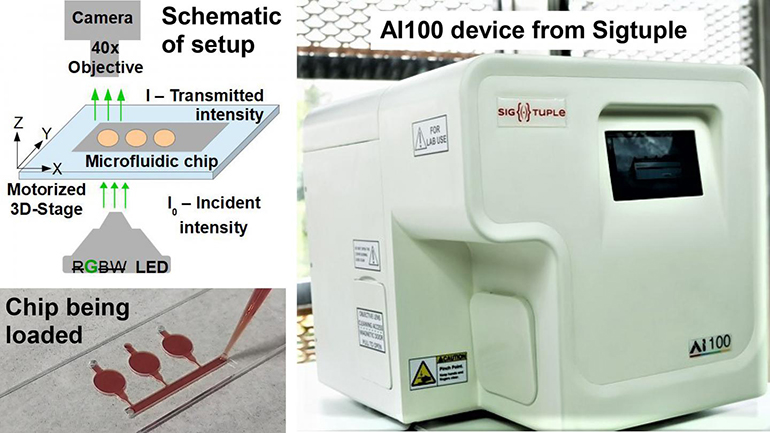
Researchers at the Indian Institute of Science and SigTuple Technologies, a company based in Bengaluru, India, have developed a method to inexpensively measure hemoglobin levels in small-volume blood samples. The technique combines a microfluidic chip and an AI-powered microscope. The researchers hope that the technology will help streamline hemoglobin measurements and make things easier for patients, as only a small volume of blood is required, and clinicians, as the required equipment is relatively inexpensive.
Hemoglobin levels in the blood are an important health marker, and can be used to help diagnose a variety of conditions, including pulmonary fibrosis and anemia. At present, the equipment used to analyze blood samples for their hemoglobin content typically also measures a variety of other parameters, with dedicated compartments and optical detection equipment for each analysis.
This means that the equipment is bulky and expensive, and requires relatively large blood samples to function. However, a dedicated hemoglobin analysis system based on imaging could help to address these issues. “In this study, we demonstrate that the applicability of a system originally designed for the purposes of imaging can be extended towards the performance of biochemical tests without any additional modifications to the hardware unit, thereby retraining the cost and laboratory footprint of the original device,” said Srinivasan Kandaswamy, a researcher involved in the study.
The system consists of a microfluidic chip onto which a small-volume blood sample is loaded. The chip runs a sodium lauryl sulfate assay to detect hemoglobin within the sample. The chip can then be viewed using a microscope with automatic AI imaging analysis to estimate the amount of hemoglobin in the sample. The microscope uses a green LED to illuminate the sample as the sodium lauryl sulfate/hemoglobin complex absorbs light at this wavelength.
The chips are inexpensive, costing 0.136 USD each, including the required reagents. The technology also has potential to measure other substances in the blood, including cholesterol, protein, and glycated hemoglobin.
“This paper lays the foundation and will also serve as a guide to future attempts to translate conventional biochemical assays onto a chip, from point of view of both chip design and reagent development,” said Kandaswamy.
Study in AIP Advances: Developing microscopy based microfluidic SLS assay for on-chip hemoglobin estimation
Flashback: HemaApp Accurately Estimates Hemoglobin in Blood Using Standard Smartphone
